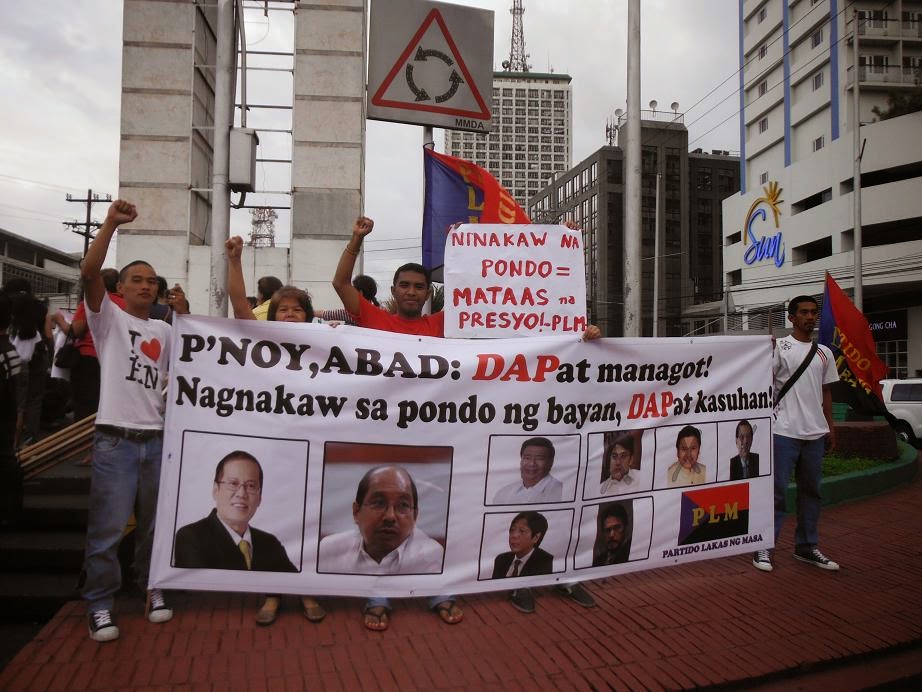An initial response to
Akbayan’s defense of its coalition politics
By Sonny Melencio, Chairman
of Partido Lakas ng Masa
Akbayan's article in today's Philippine Daily Inquirer (p. A14)
stresses the importance and need for coalition politics. Leaving aside the
rather patronizing tone, the article is also revealing in what it doesn't say.
Akbayan is in a ‘coalition government’ with the ruling party, so this
is clearly no ordinary coalition. This is a coalition with the ruling class in
power and therefore has grave consequences for the progressive movement, the
masa, and the entire nation.
The political character of
the government
The question was also posed right from the beginning: What is Akbayan
coalescing around? What is the political platform of this so-called coalition
government? If you are in a coalition government, you should be clear on what
is the reform agenda of this government.
Many of us in the Left believe that this is a government still wedded
to a neoliberal economic program. Many of us believe that the government
represents the interests of the elite. Does Akbayan agree with this, or not?
Pointedly, how does Akbayan assess the political character of the
government? The article does not address this.
.
The article also defends Akbayan's decision to transform itself from a
party of 'protest' to a party of 'governance'. Leaving aside the counter
position of ''protest' and 'governance', any political party worth its salt
should aim to be in power – to be the government. The critical question is: Do
you win government to work within and limit yourself to the existing system, or
do you win government so that you can fundamentally transform the existing
system?
Partido Lakas ng Masa (PLM) believes that we should win government in
order to fundamentally change the system.
Governance and power
We also understand that being in government (‘governance’) and being in
power are different things. Power also resides outside government, such as
corporate power and the economic and military power of imperialist nations,
which use their might to intervene in governments in order to protect their
vested interests.
The woeful inability of Akbayan to contest and hold back the neoliberal
economic agenda of the current government is testimony to this. Akbayan might
have some positions in government, but to imagine that this is the same as
winning government or being in power is to fool oneself and your supporters. To
defend its line by arguing that it's trying to influence the direction of
government is farcical. The fact is that Akbayan is unable to influence the
direction of government to the extent that it claims it can. Akbayan’s record
under the PNoy presidency demonstrates this. You merely end up becoming
co-opted in the system.
If you are using your positions in government for your own political
purposes, such as access to resources to build your base, that's a different
matter. But please don't claim that the aims are to influence and change
government policy, and so on and so forth.
Some international examples
And we too study international events and examples. We believe that in
Bolivia and Venezuela today, we have socialist parties and forces who have
actually won government and are using this power to implement anti-neoliberal
policies and change the system. This also includes mass mobilizations on a
massive scale and people’s power participation in government. Here 'protest'
and 'governance' are combined in a unified strategy and are not mutually
exclusive.
On the other hand, we also have the experience of the PT in Brazil and
the ANC in South Africa, in governments implementing essentially pro-market
neoliberal policies. Or the European and Australian Green Parties, aptly dubbed
"neoliberals on bicycles".
The problem is the system
This is also linked to an assessment of the nature of the economic and
political system. Akbayan believes, according to the article, that the system
has 'limitations'. On the other hand, we believe that the system itself is the
fundamental problem. Hence, it cannot be reformed, and the system needs to be
replaced so that meaningful and far-reaching changes can be implemented.
These debates are as old as the hills, certainly as old as Karl Marx
onwards.
As for electoral reform, we urge Akbayan to support and campaign for
the anti-dynasty bills, the anti-DAP and anti-pork bills, the freedom of
information bills, the genuine agrarian reform bills which are now key
electoral reforms ignored by the president and the ruling party. Where does
Akbayan stand on these key questions?
On compromises
There are compromises and compromises. There should be a framework to
base these compromises. Compromises that benefit and advance only the interest
of a select few, such as Akbayan’s people in Cabinet and in government, are by
no means principled. One of the main and
guiding principle in opening up compromises should be whether it advances the
interests and the struggles of the masses in general. Otherwise one ends up
compromised and becomes opportunistic.
We don’t need inane lectures on compromises in coalition politics.
Right now we need accountability from Akbayan on its role and activities in
government, not just a superficial defense of its ‘tactics’. There has been no
such accountability from this government, let alone the Akbayan leaders who are
now in Cabinet and in leading positions in government.
Akbayan also asks us to keep hoping. In whom? The President and
Akbayan? For what? For a miracle that the government will fundamentally change
its course and genuinely address the dire needs of the masses?
A pragmatic plea
Despite the article’s claim that this is not a politics of pragmatism
but based on idealism, to ask us to continue to hope under this desperate
socio-economic situation, sounds a pragmatic plea to continue supporting
Akbayan’s coalition with this government.
The masses are losing hope and large numbers have already lost hope
with this government. What is Akbayan trying to say? That we should ask the
masses not to lose hope in this government? We cannot do that, when we think
they are correct to do so. This line of asking the masses to keep their hopes
with this government will contribute to the derailing of the mass struggle.
In fact, our responsibility is not to ask them to hope harder, but to
develop a genuine alternative to this government of elite rule and neoliberal
economics. This is the big challenge that the Left faces today.






























































